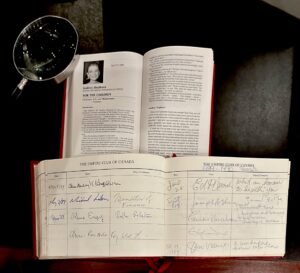Born on May 4, 1929, in Brussels, Belgium, Audrey Hepburn’s father was an English banker and her mother a Dutch baroness. While growing up, she studied ballet but discovered her true potential for acting while performing in small roles, which later led her to the lead role in the film Roman Holiday. This marked the beginning of her successful career. Today, Ms. Hepburn is a renowned international actress known for her roles in films such as Breakfast at Tiffany’s (1961) and My Fair Lady (1964). She is also recognized for her devotion to humanitarian work in the later years of her life.

1989, Audrey Hepburn and Tony Van Strubenzee Past President, ECC Dinner. ECF Photo
Ms. Hepburn served as a positive role model through her commitment to improving the lives of children worldwide. During World War II, Ms. Hepburn experienced numerous struggles, being among those who received food and medical relief right after the war in 1945. “I have known UNICEF a long time. For, almost 45 years ago, I was one of the tens of thousands of starving children in war-ravaged Europe to receive aid from UNICEF immediately after our liberation that freed us from hunger, repression and constant violence,” she said in her speech to the Empire Club of Canada on April 27, 1989.
In 1988, Ms. Hepburn became a UNICEF Goodwill Ambassador, advocating tirelessly for children’s rights worldwide. Joining UNICEF’s battle against children suffering, her task became to inform and create awareness of the needs of impoverished children. Soon after, she travelled to Ethiopia on her first official UNICEF mission, where years of drought and civil strife had caused terrible famine, ultimately impacting the country’s children and women, significantly.
Upon her return, Ms. Hepburn gave a phenomenal speech to the Empire Club of Canada. Discussing the numerous UNICEF missions, with her travels to Ethiopia, Venezuela, Ecuador, Central America, Mexico and the Sudan, she entailed her role to protect every child against famine, thirst, sickness, abuse and death. She emphasized her concern regarding large populations of countries living below the poverty level. These countries had no access to water, sanitation, electricity, primary health care, or education. Ms. Hepburn also highlighted the tragedy of poverty and how it could not be captured easily by the media and brought to the attention of the worldwide public.
Other related speeches of interest:
Christopher Plummer In Conversation With Gordon Pinsent February 11, 2011.
The Power of Film and its Influence, delivered by Norman F. Jewison, April 5, 1984
Healthier Canadian Children, Dr. K. Kellie Leitch, June 24, 2008.
Investing in Children is an Excellent Return on Investment, The Hon. Jane Stewart, March 27, 2003
Written by Mackenzie MacDonald. Mackenzie is a third-year Master of Journalism student at Toronto Metropolitan University. Her research interests include social justice and human rights issues, on matters such as gender equality, Indigenous rights, criminal justice and more.

Ms. Hepburn’s signature in the ECC guest book. ECF photo.
“Unlike droughts or floods or earthquakes, it is happening not in any one particular place, but in slums and shanties and neglected rural communities across two continents,” Ms. Hepburn said. “It is happening not at any one particular time, but over long years of increasing poverty which have not been featured in the nightly news, but which have changed the lives of many millions of people, and it is happening not because of any one visible cause, but because of an unfolding economic drama in which the industrialized nations play a leading part,” she continued. “It is spreading human misery and hardship on a scale and of a severity unprecedented in the post-war era.”
Ms. Hepburn’s passionate speech addressing the Empire Club brought to light the unfortunate realities that numerous countries were facing at the time. Large and complex humanitarian crises were on the rise, requiring significant external assistance and resources. Speaking to the Empire Club of Canada on these matters, Hepburn described the helplessness and desperation of those whose health, safety, security, and wellbeing were threatened.
Her role as a speaker informed and created awareness of the needs of children. By sharing illustrative examples of the need for the advocacy for children and what could be done through donations to UNICEF, it was clear – the burden of debt would need to be lifted for the economies of developing countries to recover and develop. This would ultimately prevent or lessen the number of children suffering from undernourishment, disease and death.
In 1992 Ms. Hepburn received the United States’ highest civilian award, the Presidential Medal of Freedom. She continued to speak for “the children who could not speak for themselves; the children who are going blind through lack of vitamins, children who are slowly being mutilated by polio, children who are wasting away in so many ways through lack of water; for the estimated 100,000,000 street children in this world who have no choice but to leave home in order to survive, who have absolutely nothing but their courage and their smiles and their dreams; children who have no enemies yet are invariably the first tiny victims of wars that are no longer confined to the battlefield but which are being waged through terror and intimidation and massacre; children who are therefore growing up surrounded by the horrors of violence.” A year after receiving the highest civilian award in the United States, Ms. Hepburn passed away at her home in Switzerland on January 20, 1993.
The work of Audry Hepburn will never be forgotten. Her dedication to helping UNICEF build a better and safer world for children lives on through her legacy, continuing through donors delivering the life-saving aid she received as a child.
